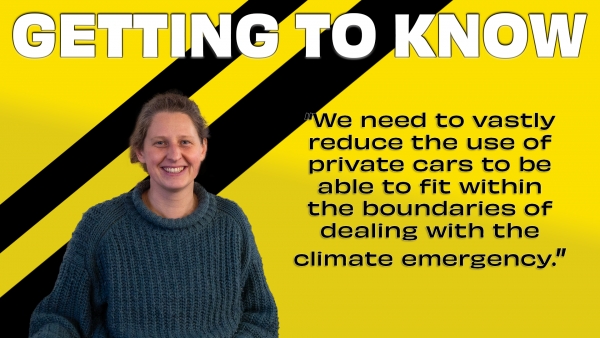
Getting to know Reclaim Our Buses with Emilia Melville
Posted on: 09 Feb 2024This week we spoke to Emilia Melville, a coordinator for WESTACT's Reclaim Our Buses campaign!
1. Can you give us a quick introduction to the Reclaim our Buses campaign?
Reclaim our Buses is a campaign for getting public control of the buses of the West Of England. It’s West of England-wide – so that means Bristol, Bath & North-East Somerset, North Somerset and South Gloucestershire.
It’s a bit complicated, but most of that area is covered by the West of England Combined Authority, which Dan Norris is the mayor of. That authority is now the transport authority for the area. With that devolution, there’s the power to franchise the buses – which means bringing them into public control, in the same way the buses in London are in public control. We want him to do that – he has the powers to do it.
The next step is to commission a formal investigation of bus franchising. That would mean he and his officers get access to the commercial data from the bus companies of their operations over the last several years, and that means they can do an informed business case as to whether taking the buses into public control would be the right thing for our area.
That first step is really important, and he’s not doing it yet. So we are repeatedly telling him that he should do it!

2. Could you explain, in your own words, what the difference is between bus franchising, or public control, and public ownership?
Public ownership means that the local authority actually owns the running of the buses, the buses themselves, the depots, directly employs all the bus drivers, et cetera.
Public control means that the local authority decides what the routes should be, decides what the ticket prices should be, and franchises out each of the routes. So, they’ll set the parameters of the timetables, and ask “Which companies want to offer us to run this route, on this timetable, and how much will you charge?” They then receive all the ticket sales revenue, and they pay the company to operate the route according to their specifications.
That’s different to the current system – we’ve got two types of bus routes in this system. Some routes are for-profit, commercially-run bus routes, and the operators can decide to run those routes, they can decide to stop running those routes – they don’t have to give very long notice to change them. If they deem that the route is no longer profitable, they can stop running it – which then means that whoever was reliant on that route is suddenly out of a bus route.
Then there’s another segment of routes, which is the subsidised ones. Local governments, when they think that a particular bus route is socially important, can choose to pay a subsidy – it’s still run by a commercial company, it’s just that the money for it is subsidised by the local government.
The franchise system means all of that gets put under one umbrella, and the commerical routes can cross-subsidise the non-commerical routes, and you’re running it as a network – which currently you’re not allowed to do.
3. Is public control a stepping stone toward public ownership, or is it an end in and of itself?
It could be either. If you want to have public ownership, public control is an important step in that direction, or you can just go for the public control and run it the way that Transport for London have been running their operations for decades – and it works perfectly well like that.
One of the arguments that Dan Norris has made against progressing franchising is that ownership might be a better option – but in practice all of the things you’d do toward bus franchising would put us in a much better position if we do decide to go for public ownership.
In the '80s, bus use thrived with supportive policies and affordable fares.??
— Reclaim Our Buses (West of England) (@ReclaimOurBuses) February 7, 2024
Deregulation caused a 50% drop in trips, escalating fares, and deteriorating services.????
Deregulation impacts quality, pay, and conditions, affecting diverse communities and limiting opportunities.????
Do you have an opinion on which you would prefer us to be using?
I probably would say that public control is better. We have had experience in another sector – the energy sector – where local government sets up a publicly owned company competing with the commercial companies. That doesn’t make sense.
I think it’s very unlikely that any future government will create legislation that bans commercial bus operators, so that means that any public ownership would be in the context of competing with commerical bus operators. In a franchise system, that could work quite well – without a franchise system, it’s not going to work.
In simple terms, what are the benefits of franchising?
The big benefits of franchising is we would have a cheaper, more effective, and better designed network of buses – and it would put us in a much better position to have reliable, affordable routes that we need.
You’re also the co-director of Praxis, a net zero research and facilitation organisation. Is there a relationship between franchising, and the environment?
Yeah, absolutely; how I came to be doing this work was through a long career of commitment to climate action. I was working on sustainable energy, and realised that with energy we’ve made a lot of progress on making it more climate-friendly, whereas with transport we have not.
Particularly in Bristol, we have very poor public transport. I happen to be able to cycle to the places I need to go, but I can’t tell people: “Oh, just get rid of your car.”, because there isn’t a public transport system that is good enough to pick that up. We need to vastly reduce the use of private cars to be able to fit within the boundaries of dealing with the climate emergency.
The Cabot Institute did a report looking at how much of a modal shift away from cars to other modes of transport we would have to make to achieve the net zero by 2030 goal that is our climate emergency declaration; we would need to reduce the maximum journeys by car to 20% [cars currently represent 51% of all journeys].
It’s become clear that, whilst it doesn’t solve all the problems, it’s a necessary step to franchise the buses in order to have a city that is less dependent on cars.

What else can we do to improve Bristol’s transport network? There’s been a lot of talk around trains lately…
The Reclaim Our Buses campaign came out of WESTACT, which stands for West of England Shared Travel and Active Transport. WESTACT has this vision of integrated transport – it’s about how the buses line up with the trains.
We have a new train station that’s about to open – Ashley Down Station. The people in the local rail campaign, Bristol Rail Campaign, have had to really push to say that there should be a bus stop that stops near the train station on Muller Road. You’d think it was obvious that you’d want a bus stop so people can do the next bit of their journey, but that kind of integrated thinking isn’t happening as much as it should.
It’s about really thinking through how people do their whole journey. Walking is part of a journey. You walk to the train station, you walk to the bus stop – you might walk some distance to your car, even. The work of the Bristol Walking Alliance is looking at pavement quality, how much pavements are blocked by cars parking on them, bins…
For people who have mobility issues you don’t want rugged pavements, there’s a need for the right kind of dropped curbs, no parking on the dropped curbs – so it’s very difficult for a wheelchair user to get to the bus stop.
So all these things need to be thought through as a whole journey, not just a particular mode of transport.
If you were Mayor of Bristol for the day, what would you do?
I would put in a rapid transit system – which may or may not go underground for parts of it. That’s a very controversial, polarised thing but as the Bristol Rail Campaign people say: we already have some tunnels in our Severn Beach Railway line that goes underneath Clifton. But some kind of tram, or light rail, maybe it’s a train that goes on to the existing train line and comes off and becomes a tram on the streets.
I would make sure that the first route goes to serve communities that are currently really lacking in public transport – so, probably going to Hartcliffe, or somewhere that is outside the main attention of public transport, rather than another way of getting between Bristol and Bath.
Article by:

Patrick is a filmmaker with so much Bristol in his blood the white blood cells are graffiti'd. Educated at the Northern Film School in Leeds, he’s returned home to be a Videographer and Reviewer for 365Bristol and BARBI. When he’s not messing about with cameras, he enjoys playing guitar, spending far too much time on tabletop RPGs, and being an awful snob about cider. Have a look at his work here, or get in touch at patrickb@365bristol.com.

